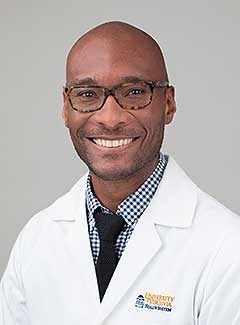These days it seems like everyone has an opinion about politics, and your patients are no exception.
That’s probably not surprising given the intense debate in Washington about healthcare reform that has gone on for months and centered around the Republican effort to repeal and replace the Affordable Care Act. Many people want to hear their physician’s perspective on the issue.

But it’s not easy to swallow some views. Taison Bell, M.D., an internal medicine physician who lives in Charlottesville, Virginia, and works at the University of Virginia Health System, described how it felt to know that white nationalists, some carrying torches, were marching through town last weekend chanting antiminority and anti-immigrant slogans.
In a post on KevinMD, Bell said he's had to separate out personal feelings that could affect the way he delivers care or that could impact relationships with friends and colleagues.
RELATED: 3 ways to help doctors and staff deal with racist patients
Throughout the discussion about preparing the hospital for the rally in Charlottesville, where one woman and two police officers died and many others were injured, Bell says he didn’t question his ability to care for someone injured while demonstrating against racial equality. As a doctor he would give his full effort.
“This strategy has worked well, but it has also left me with a blind spot. I wasn’t able to anticipate the images of racial terrorism blanketing the news coverage ahead of time and reflect on how it may affect me. I couldn’t visualize the death and destruction where I shared laughs and treats with my son just days before. I couldn’t see all of this happening in my new home," he wrote.
"But now that I have seen and experienced this, my space to isolate these feelings is growing in my conscience. And I wonder for how much longer I can control it.”
RELATED: Doctors’ politics can influence patient treatment
Bell is not alone. Jennifer Adaeze Okwerekwu, M.D., a second-year resident in psychiatry working in Cambridge, Massachusetts, says she faced racial prejudice when she was a medical student at the University of Virginia and still faces hatred from patients.
“This is the America I know, the medicine I know. Bigotry in a hospital gown—it’s a risk I face every day when I go into work,” she writes on STAT. But supportive colleagues who stand up to racism do make a difference, she adds.
The American College of Physicians, which at a recent meeting of its Board of Regents adopted a policy statement recognizing hate crimes as a public health issue, said it is time to end prejudice and discrimination and called on physicians to educate people.
“It is imperative that physicians, and all people, speak out against hate and hate crimes and against those who foster or perpetrate it, as was seen in the tragic events that occurred in Charlottesville, Virginia,” said President Jack Ende, M.D., in a statement.